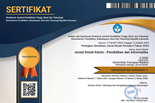Penilaian Tingkat Kesiapan Penerapan E-Learning pada Politeknik Keuangan Negara STAN
Abstract
E-learning readiness adalah aspek penting yang menentukan kesuksesan suatu organisasi untuk menerapkan e-learning. Penelitian ini dilakukan untuk mengukur tingkat e-learning readiness Politeknik Keuangan Negara STAN dalam menerapkan e-learning. Data diperoleh dari sampel yang terdiri dari 48 dosen, 201 mahasiswa, dan 63 orang staf akademis kemudian dianalisis dan dimasukkan dalam kategori “siap” atau “tidak” sesuai dengan standar penilaian. Hasil penelitian menunjukkan bahwa mahasiswa dan dosen PKN STAN secara umum telah siap untuk menerapkan e-learning, sedangkan lembaga masuk dalam kategori perlu ditingkatkan. Sumber daya yang dianggap masih perlu ditingkatkan dan membutuhkan beberapa perbaikan meliputi sumber daya manusia, dukungan teknis, dan infrastruktur teknis.
Full Text:
PDFReferences
Albidewi, Ibrahim dan Radi Tulb. 2014. Promise and Challenge of e-learning - Literatur Review. European Scientific Journal January 2014 Edition vol.10.
Aldhafeeri, Fayiz dan Badrul H. Khan. 2016. Teachers and Students views on e-learning Readiness in Kuwait’s Secondary Public Schools. Journal of Educational Technology System, Vol 45(2) 202-235.
Akaslan, D., & Law, E. 2011. Measuring Teachers' Readiness for E-learning in Higher Education Institutions Associated With The Subject of Electricity in Turkey. Paper presented at the Global Engineering Education Conference (EDUCON), 2011 IEEE.
Albarrak, A. 2010. Designing E-learning Systems in Medical Education: A Case Study. International Journal of Excellence in Healthcare Management, 3(1), 1-8.
Aydin, C., & Tasci, D. 2005. Measuring Readiness For E-Learning: Reflections from An emerging Country.Educational Technology & Society, 8(4), 244-257.
Chapnick, S. 2000. Are you ready for E-learning?-E-learning readiness assessment. Diakses pada tanggal 29 September 2017 dari http://www.learning circuits.org/2000/nov2000/Chapnick.htm
Darab, B., & Montazer, G. 2011. An eclectic Model For Assessing E-learning Readiness in The Iranian Universities. Computers & Education, 56(3), 900-910.
David, F. R. 2011. Strategic Management: Concepts and Cases. New Jersey: Prentince Hall.
Ghozali, Imam. 2016. Model Persamaan Struktural Konsep dan Aplikasi dengan Program AMOS 24 Update Bayesian SEM Edisi 7. Semarang: Badan Penerbit Universitas Diponegoro.
Kattoua, T, Musa Al-Lozi, dan Ala’aldin Alrowwad. A review of Literature on E-Learning System In Higher Education. International Journal of Business Management and Economic Research(IJBMER), Vol 7(5),2016, 754-762
Keramati, A., Afshari Mofrad, M., & Kamrani, A. 2011. The Role of Readiness Factors in E-learning Outcomes: An empirical Study. Computers & Education, 57(3), 1919-1929.
Kituyi G. M, T. 2013. A framework for the integration of e-learning in higher education institutions in developing countries. International Journal of Education and Development using Information and Communication Technology, 19-36.
Lopes, C. 2007. Evaluating E-learning Readiness in A health Sciences Higher Education Institution. Paper presented at the Proceedings of IADIS International Conference of E-learning, Porto.
Malhotra, N.K dan Birks, D.F. 2007. Marketing Research: An Applied Approach, 3rd European Edition. UK: Pearson Education.
Mercado, C. 2008. Readiness Assessment Tool for an E-Learning Environment Implementation. Special Issue of the International Journal of the Computer, the Internet and Management, Vol. 16 No. SP3.
Mosa, Asma Ali, Mohd. Nazri bin Mahrin, dan Roslina Ibrrahim. 2016. Technological Aspects of E-Learning Readiness in Higher Education: A Review of the Literature. Computer and Information Science; Vol. 9, No. 1.
Oketch, H., Njihia, J., & Wausi, A. 2014. E-learning Readiness Assessment Model In Kenyas’ Higher Education Institutions: A Case Study Of University Of Nairobi. International Journal of Scientific Knowledge, 5(6).
Psycharis, S. 2005. Presumptions and Action Affecting An e-learning Adoption by The Educational
DOI: https://doi.org/10.21107/edutic.v7i1.7057
Refbacks
- There are currently no refbacks.
Copyright (c) 2020 Acwin Hendra Saputra

This work is licensed under a Creative Commons Attribution 4.0 International License.
Indexed by:
 J. Ilm. Edutic is licensed under a Creative Commons Attribution 4.0 International License.
J. Ilm. Edutic is licensed under a Creative Commons Attribution 4.0 International License.















